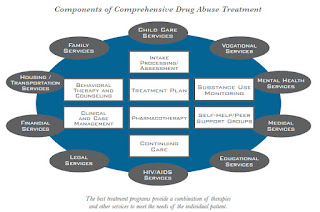WHAT IS DRUG ADDICTION TREATMENT ?
 Drug treatment is intended to help addiction individuals stop compulsive drug seeking and use treatment can occur in a variety of settings take many difference forms and last for different lengths of time because drug addictions is typically a chronic disorders characterized by occasional relapses a short term one time travel treatment is usually not sufficient for many treatment is a long-term process that involves multiple interventions and regular monitoring.
Drug treatment is intended to help addiction individuals stop compulsive drug seeking and use treatment can occur in a variety of settings take many difference forms and last for different lengths of time because drug addictions is typically a chronic disorders characterized by occasional relapses a short term one time travel treatment is usually not sufficient for many treatment is a long-term process that involves multiple interventions and regular monitoring.There are a variety of evidence-based approaches to treating addiction drug treatment can include behavioral therapy such as cognitive behavioral therapy or contingency management medications or their combination the specific type of treatment or combination of treatment will vary depending on the patient's individual needs and often on the type of drugs they use